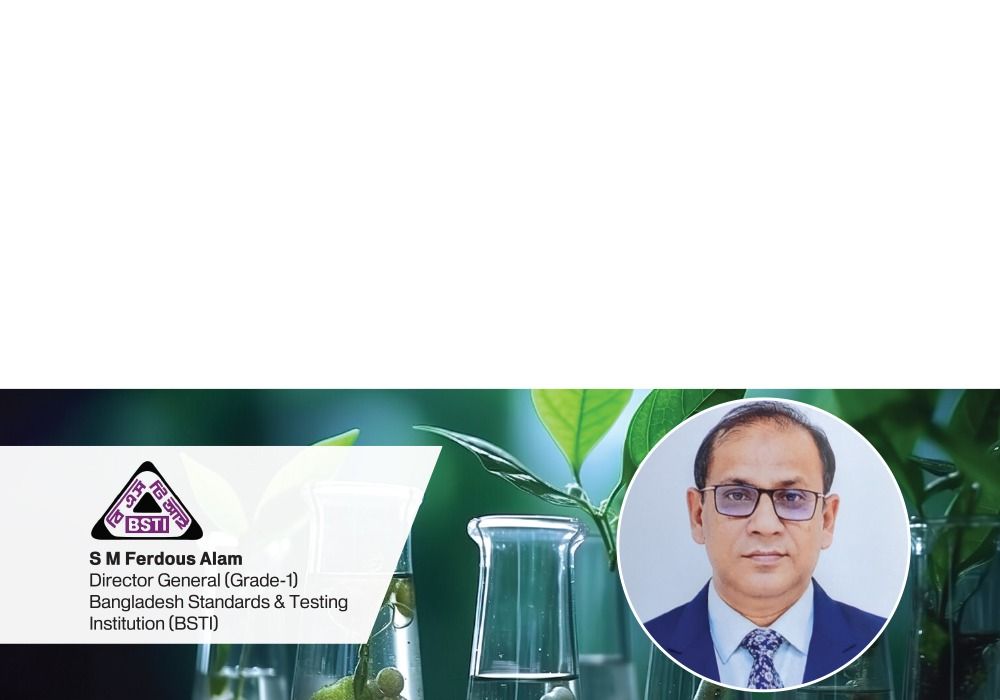- info@ficci.org.bd
- |
- +880248814801, +880248814802
- Contact Us
- |
- Become a Member
- |
- |
- |
- |
- |

Bangladesh with Vision 2041 as its compass and the Sustainable Development Goals (SDGs) of 2030 on the horizon, the country is navigating a course toward prosperity, resilience, and global competitiveness. In this grand journey, the Bangladesh Standards and Testing Institution (BSTI) hold the wheel of the national quality infrastructure. Standards are more than technical documents which may look dry on paper, but in practice they are the hidden architecture of modern life shaping safe products, clean energy, nutritious food, and fair trade. Without them, progress would be a house built on sand. The readiness of BSTI is therefore synonymous with Bangladesh's readiness to meet its global commitments.
Standards as Enablers of the SDGs
The SDGs call for integrated progress across areas such as health, education, sustainable industry, responsible consumption, and climate resilience. Each of these areas is directly connected with standards. For example:
· SDG 2 (Zero Hunger): BSTI has developed and enforced fortification standards for edible oil, iodized salt, and rice to improve public nutrition.
. SDG 3 (Good Health and Well-Being): Food standards ensure safety and protect consumer health.
. SDG 7 (Affordable and Clean Energy): Energy efficiency and renewable energy standards support the shift toward greener technologies.
. SDG 9 (Industry, Innovation and Infrastructure): Conformity assessment services ensure industrial competitiveness and resilience.
· SDG 12 (Responsible Consumption and Production): Standards for eco-labeling, waste management and environmentally friendly products promote sustainability.
By aligning national standards with international references such as International Organization for Standardization(ISO), International Electro technical Commission(IEC), Codex Alimentarius Commission(CAC), Standards and Metrology Institute for Islamic Countries (SMIIC), Bureau International des Poids et Mesures(BIPM), Organisation Internationale de Metrologie Legale(OIML) and South Asian Regional Standards Organization(SARSO), BSTI ensures that Bangladeshi products meet both domestic and global requirements. This strengthens trade competitiveness while protecting consumers and the environment.
Institutional Strengthening for 2030
BSTI has not stood idle. Over the past decade, it has quietly but steadily built muscle. BSTI has expanded its reach and upgraded its infrastructure to respond to evolving needs:
Testing and Certification: Laboratories in food, construction materials, electrical goods, and environment- related products now provide reliable conformity assessment services. Efforts are ongoing to increase testing parameters in line with global best practice.
Digital Transformation: BSTI has taken initiative to introduce online certification, licensing, and e-payment systems, reducing time and cost for businesses. A roadmap toward latest technology-based traceability is under consideration.
Capacity Building: Continuous training of inspectors and officers ensures up-to-date knowledge on modern inspection methods, emerging risks, and effective communication with industry.
Trade Facilitation: As the focal point of the WTO Technical Barriers to Trade (TBT) Enquiry Point, BSTI enables exporters to access updated information on technical regulations and conformity requirements in overseas markets.

Clouds on the Horizon
Of course, the road to 2030 is not free of potholes. Resources are finite, and modernizing every laboratory tocutting-edge standards is a tall order. Advanced testing in high-tech sectors remains a work in progress. Public awareness of standards especially in rural markets still lags, meaning unsafe or substandard goods sometimes slip through. These are not insurmountable obstacles, but they are reminders that progress is rarely a straight line .. Addressing these challenges will be critical for 2030 readiness.
Pathway to Sustainable Development
To turn ambition into reality, BSTI is sharpening its focus on a handful of priorities:
1. Green Standards and Climate Action: Introducing standards for renewable energy technologies, sustainable agriculture, and low-carbon construction materials.
2. Food and Nutrition Security: Scaling up enforcement of fortification standards and collaborating with ministries to expand coverage.
3. Inclusive Trade: Supporting SMEs with certification and training to access global value chains.
4. Innovation and Digitalization: Promoting smart conformity assessment through artificial intelligence, e-certification, and paperless processes.
5. International Collaboration: Strengthening engagement with ISO, IEC, Codex, and regional platforms to adopt emerging global standards quickly.
As Bangladesh marches toward 2030, standards will serve as the backbone of sustainable industrialization, consumer protection, and trade growth. BSTI, as the custodian of national quality infrastructure, is committed to ensuring that every product, service, and process aligns with the principles of safety, sustainability, and global competitiveness. By investing in modern laboratories, strengthening institutional capacity, and fostering international cooperation, BSTI is positioning itself as a key enabler of Bangladesh's pathway to sustainable development. The readiness of BSTI for 2030 is not just about compliance. It is about building confidence among consumers, investors, and global partners that Bangladesh is prepared to deliver safe, sustainable, and competitive products for the world.





